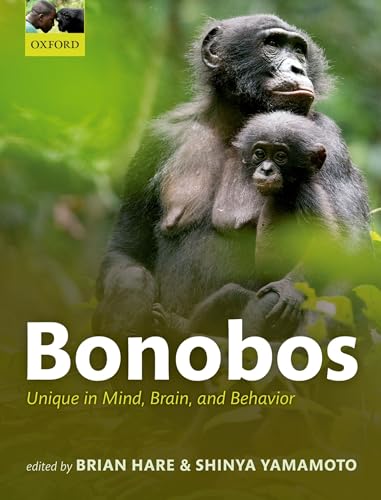Items related to Bonobos: Unique in Mind, Brain, and Behavior

Synopsis
The bonobo, along with the chimpanzee, is one of our two closest living relatives. Their relatively narrow geographic range (south of the Congo River in the Democratic Republic of Congo) combined with the history of political instability in the region, has made their scientific study extremely difficult. In contrast, there are dozens of wild and captive sites where research has been conducted for decades with chimpanzees. Because data sets on bonobos have been so hard to obtain and so few large-scale studies have been published, the majority of researchers have treated chimpanzee data as being representative of both species. However, this misconception is now rapidly changing.
With relative stability in the DRC for over a decade and a growing community of bonobos living in zoos and sanctuaries internationally, there has been an explosion of scientific interest in the bonobo with dozens of high impact publications focusing on this fascinating species. This research has revealed exactly how unique bonobos are in their brains and behavior, and reminds us why it is so important that we redouble our efforts to protect the few remaining wild populations of this iconic and highly endangered great ape species.
"synopsis" may belong to another edition of this title.
About the Author
Brian Hare, Associate Professor of Evolutionary Anthropology, Center for Cognitive Neuroscience at Duke University, USA,Shinya Yamamoto, Associate Professor, Kobe University, Japan
Dr Brian Hare is an associate professor of Evolutionary Anthropology and a member of the Center for Cognitive Neuroscience at Duke University in the United States. Since 2007, he has published over two dozen peer-reviewed empirical papers on the cognition, behavior, physiology, morphology, and evolution of the bonobo. He has studied bonobos in zoos, African sanctuaries and in the wild. His research focuses on identifying unique cognitive traits as well as understanding evolutionary processes that produce them.
Dr Shinya Yamamoto is an associate professor at Kobe University in Japan. He has published research on both wild and captive chimpanzees. More recently he began studying the behavior of wild bonobos at the Wamba field site in the Democratic Republic of Congo. His research concentrates on the evolution of cooperation, culture, and understanding others.
Review
"I believe this volume will contribute to establishing bonobos as a species of interest on their own, which can inform our understanding of human evolution asmuch as chimpanzees. It is certainly an excellent entrance to the fascinating world of bonobos." -- The Quarterly Review of Biology
"Hare and Yamamoto present a timely update to understandings of this unique ape by curating field and captive research...Authors use new genetic, demographic, and geospatial technology and modeling to test alternative hypotheses, pointing readers to areas of future research... Recommended." -- L. K. Sheeran, CHOICE
"About this title" may belong to another edition of this title.
- PublisherOxford University Press
- Publication date2017
- ISBN 10 0198728522
- ISBN 13 9780198728528
- BindingPaperback
- LanguageEnglish
- Number of pages304
- EditorHare Brian, Yamamoto Shinya
- Rating
Shipping:
FREE
Within U.S.A.
Search results for Bonobos: Unique in Mind, Brain, and Behavior
Bonobos: Unique in Mind, Brain, and Behavior
Seller: BooksRun, Philadelphia, PA, U.S.A.
Paperback. Condition: Fair. Illustrated. Heavy wear. Ship within 24hrs. Satisfaction 100% guaranteed. APO/FPO addresses supported. Seller Inventory # 0198728522-7-1-13
Quantity: 1 available
Bonobos : Unique in Mind, Brain and Behavior
Seller: GreatBookPrices, Columbia, MD, U.S.A.
Condition: New. Seller Inventory # 28882797-n
Quantity: 1 available
Bonobos
Seller: PBShop.store US, Wood Dale, IL, U.S.A.
PAP. Condition: New. New Book. Shipped from UK. Established seller since 2000. Seller Inventory # FU-9780198728528
Quantity: 7 available
Bonobos : Unique in Mind, Brain and Behavior
Seller: GreatBookPrices, Columbia, MD, U.S.A.
Condition: As New. Unread book in perfect condition. Seller Inventory # 28882797
Quantity: 1 available
Bonobos: Unique in Mind, Brain, and Behavior
Seller: Revaluation Books, Exeter, United Kingdom
Paperback. Condition: Brand New. 285 pages. 9.50x7.50x0.50 inches. In Stock. Seller Inventory # __0198728522
Quantity: 1 available
Bonobos
Seller: PBShop.store UK, Fairford, GLOS, United Kingdom
PAP. Condition: New. New Book. Shipped from UK. Established seller since 2000. Seller Inventory # FU-9780198728528
Quantity: 7 available
Bonobos: Unique in Mind, Brain, and Behavior
Seller: THE SAINT BOOKSTORE, Southport, United Kingdom
Paperback / softback. Condition: New. New copy - Usually dispatched within 4 working days. 720. Seller Inventory # B9780198728528
Quantity: Over 20 available

